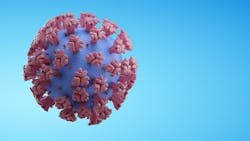Based on findings from a new study by a Johns Hopkins Medicine-led research team, an effective means of fighting SARS-CoV-2, the virus that causes COVID-19, may be possible that circumvents the problem of waning immunity often observed when current vaccines deal with emerging COVID variants.
The method uses a small molecule inhibitor (a molecule approximately 1 nanometer in size that inhibits specific interactions between proteins) called RK-33 to block the virus’s ability to take over a host cell’s “genetic manufacturing plant” and make copies of itself.
The research was first posted online Aug. 25, 2022, in the journal Frontiers in Microbiology.
RK-33, the DDX3-inhibitor with great promise as a cancer fighter, is now being seriously considered for a second therapeutic function: a broad-spectrum antiviral agent.
Along with testing RK-33’s impact on SARS-CoV-2 infectivity and reproduction, the researchers extended their study to determine if the inhibitory action observed was limited to specific variants of the virus or would be effective against multiple variants. They used RK-33 to target DDX3 in laboratory cells infected with four variants of SARS-CoV-2 — the original virus and the alpha, beta and delta variants.

